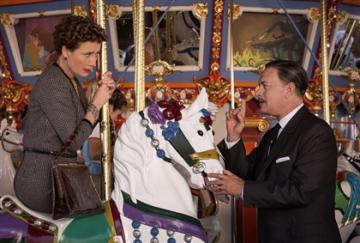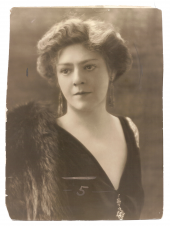A spoonful of charm saves Mary Poppins, Disney and 'Mr. Banks'
Bert (Dick Van Dyke): I know a man with a wooden leg named Smith.
Uncle Albert (Ed Wynn): What's the name of his other leg?
Convulsive laughter greeted that line, from kids and adults alike. The timing was perfect, and the 1964 film -- like Mary Poppins herself -- was practically perfect in every way.
The film about the film is less perfect, starting with its esoteric label, "Saving Mr. Banks." The title character is no relation to Private Ryan. We're expected to know he's the stern banker-father of the kids that magic nanny Mary Poppins descends (via umbrella) to watch over and liberate.
Might as well call it "Saving Mr. Hanks" -- as in Tom, who plays Walt Disney in a pickle: His young daughters begged him to make a movie of their favorite book, P.L. Travers' "Mary Poppins." He promised to do so but failed to reckon with the author-curmudgeon, who refuses to give him -- or anybody -- the legal rights to mess with Mary in a movie. First published in 1934, Travers' "Poppins" had several sequels, but, by the 1960s, her sales and royalties had dwindled. Cash-strapped, she grudgingly flies to Los Angeles to hear Disney's pitch for an adaptation.
First hint of impending trouble for Walt comes on the plane when fussy Travers (Emma Thompson) asks a passenger with a baby, "Will the child be a nuisance?"
Met at the airport by kindly chauffeur Ralph (Paul Giamatti), she sniffs the alien air and says, "It smells of ...."
"Jasmine?" Ralph offers.
"Chlorine, and sweat," she replies.
Upon delivery to her hotel, she's appalled by the plethora of Disney character dolls supplied in her room, including Winnie the Pooh ("Poor A.A. Milne!") and "sickened by the thought" of visiting Disneyland.
"I know what he's going to do to her," Travers fumes. Mary Poppins is the antithesis of whimsy or sentiment, but Disney will have her "cavorting and twinkling."
She's right. Walt pulls out all the stops, attempting to dazzle her with his storyboards and the infectiously cheery songs of brothers Robert (B.J. Novak) and Richard (Jason Schwartzman) Sherman. But prickly Travers is not infected. "No music!" she decrees. "You don't know what she means to me!"
"You've got to share her," Disney pleads.
Director John Lee Hancock and screenwriters Kelly Marcel and Sue Smith present parallel present and past stories, alternating between '60s California and flashbacks to Travers' idyllic -- but then traumatic -- childhood in Edwardian Queensland. Contrary to popular assumption, she was Australian, not British. The thesis that Mr. Banks in "Mary Poppins" was based on her own authoritarian father (and that Mary "saves" him by revealing his better nature) seems more a Disney than a Travers idea. Ditto, the idea that only Disney's melodramatic confession about his own tough childhood persuaded her to agree to the film.
In any case, her father as played here by Colin Farrell is far from a stern authoritarian. Rather, he's a loving, overindulgent father and a chronic alcoholic -- basically just ill-fated.
Ms. Thompson has described Travers as "a woman of complexity and contradiction," quoting her as saying women's lives divide into three parts: "nymph, mother and crone." In California, she was clearly in the crone stage with her sweater-chains and horribly permed hair. But Ms. Thompson's characterization seems far from complex. She plays an uptight, persnickety English spinster -- single, childless and unhappy. It's not up to the brilliant subtlety of her performances in "Much Ado About Nothing," "Sense and Sensibility," "Howard's End" and "An Education." Her turnaround transformation upon hearing "Let's Go Fly a Kite" is hard to swallow, even with a spoonful of sugar.
Mr. Hanks' Disney seems similarly sugarcoated: He's convincing visually but sooo sweetly avuncular.
Disney, by all accounts, was ruthlessly tough to work for. As for the premise of the promise -- the motivation to film "Mary" for his daughters -- by the time the film appeared in 1964, they were 31 and 28, probably no longer pining for it. Could $$$ have been his equal motivation? The film omits any hint of that, or that Travers disliked the film and refused to let any more of her books be filmed.
Ah, well ... Emma as Travers has funny jabs at Dick Van Dyke (as "one of the greats") and at the very thought of animated penguins. You'll get a pang of longing to hear the full version of "Feed the Birds" (the 1964 score's best song), and a reminder of the fact that icons are what you make of them. In that regard, the greatest Mary Poppins spinoff inspiration was (and remains) legendary Post-Gazette cartoonist Tim Menees' use of her as the batty umbrella-laden symbol of Mayor Sophie Masloff!
The best moments of "Saving Mr. Banks" are the gorgeously photographed Australian scenes, with their dusty carnivals and kangaroos. Which leads us to think this might have been better as a straightforward biography, without the big Disney focus.
But even with a few sugary spoonfuls too many, it's still a charming celebration of children's literature -- for fun, profit and therapy.






